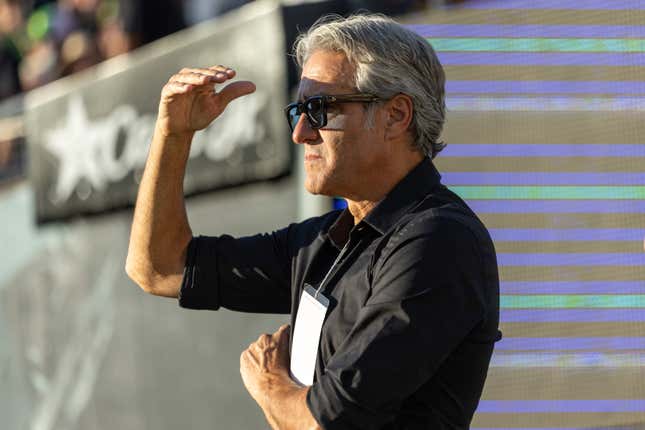In This Story
When Elliot Hill took over as Nike’s CEO, he knew the company was struggling, but one moment apparently made it clear just how bad things had become.
It was December 2024, at the AT&T Stadium (T+0.75%) in Dallas, when Hill said he realized the extent of the crisis. Nike (NKE-2.71%) had secured a crucial contract extension with the NFL for its uniforms, narrowly avoiding the loss of one of its most important partnerships, Fortune first reported.
“Roger was my first phone call when I took over,” Hill told the magazine, referring to NFL commissioner Roger Goodell.
Though Nike had dodged a major blow, nearly losing the deal to a competitor helped Hill see the scale of the sportswear giant’s crisis — and the bigger picture was grim. Nike faced its worst year in decades in 2024. Sales had dropped globally, and the stock had fallen nearly 60% from its 2021 highs. The sportswear giant’s troubles weren’t just financial; they were cultural and strategic.

Former CEO John Donahoe’s aggressive push into e-commerce had backfired. In April 2024, he stated that he was fed up with remote work and that a “boldly disruptive shoe” couldn’t be made on Zoom. In a push to boost online sales, Nike severed ties with major retailers, including Macy’s, DSW (DBI-3.67%), and Foot Locker (FL-4.46%). Meanwhile, Nike laid off hundreds of employees, including senior executives.
Hill, who has over 30 years of experience at Nike, seemed to waste no time confronting the issues. During a December earnings call, he laid out a plan on the company’s core – sport and performance – and to repair damaged retailer relationships. The road to recovery won’t be quick, but Hill has emphasized the importance of a long-term strategy over short-term pain.
Wall Street, though cautious, shared similar sentiments and remained optimistic about Hill’s leadership, given his role in growing Nike to over $39 billion in annual revenue. When the company reported its second-quarter earnings, results came in better than expected.
Nike’s current plan is to pivot. The company is cutting back on taste-making street teams across 12 cities globally, and leaning on Air Jordan and Dunk nostalgia. Sneaker innovation, once a key driver, has taken a backseat, according to Fortune.
Whether AI will play a role, or how President Donald Trump’s looming tariffs may impact this pivot, remains to be seen.
Looking ahead, Nike is also focusing on personalized gear and unearthing new ways to connect with consumers in the age of social media. Whether AI will play a role, or how President Donald Trump’s looming tariffs may impact this pivot, remains to be seen.